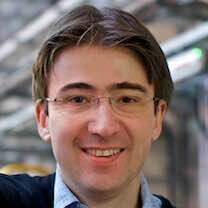VIDEO - Science at Large Scale Research Facilities - Neutron scattering and imaging at the Swiss Spallation Source SINQ, with Michel Kenzelmann


VIDEO - Science at Large Scale Research Facilities - Neutron scattering and imaging at the Swiss Spallation Source SINQ, with Michel Kenzelmann
An introduction to the Swiss Spallation Source SINQ, its neutron scattering and imaging instrumentation, and the SINQ science programme.
Speaker: Michel Kenzelmann, PSI SINQ, Switzerland.
This webinar is part of LINXS webinar series: Science at Large Scale Research Facilities, introducing the latest scientific breakthroughs and developments at large scale research facilities from all over the world.
Abstract
Michel gives an introduction to the Swiss Spallation Source SINQ, its neutron scattering and imaging instrumentation, and the SINQ science program. As a national neutron source, SINQ has been serving the international neutron scattering community for almost a quarter of century. He will give an update about recent upgrades of the neutron guide system and the neutron instrumentation, and highlight some of the capabilities that may be of interest to the scientific user community. In addition, he presents scientific highlights of the external user program and of in-house research.
Biography
Michel Kenzelmann received a D.Phil. from Oxford University in 2001 with his work on low-dimensional topological quantum magnetism using neutron scattering. He worked as a postdoctoral fellow at Johns Hopkins University and NIST (USA) from 2001 and 2004 studying quantum magnetism and magnetically-indued ferroelectricity. From 2004 to 2008, he held a professor fellowship of the Swiss National Science Foundation at ETH Zürich. From 2008 to 2017 he led the Laboratory for Scientific Developments and Novel Materials. In this role, he was responsible for the technical aspects of SINQ instrumentation, sample environment and novel materials discovery. Since 2017 he leads the Laboratory for Neutron Scattering and Imaging at the Paul Scherrer Institut, and directs the scientific program of SINQ. He holds a titular professorship at the University of Basel where he teaches courses on large-facility experimental methods for condensed matter physics, and advanced materials and their applications.
